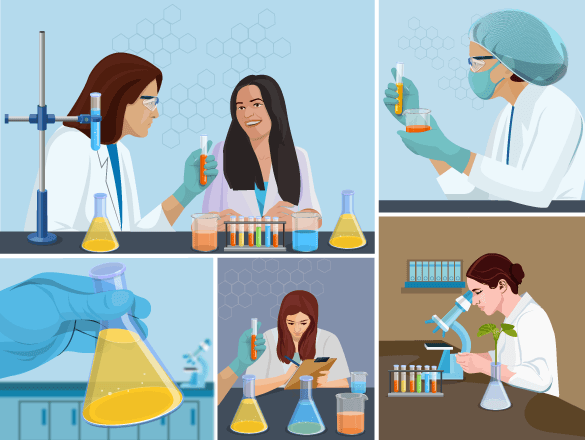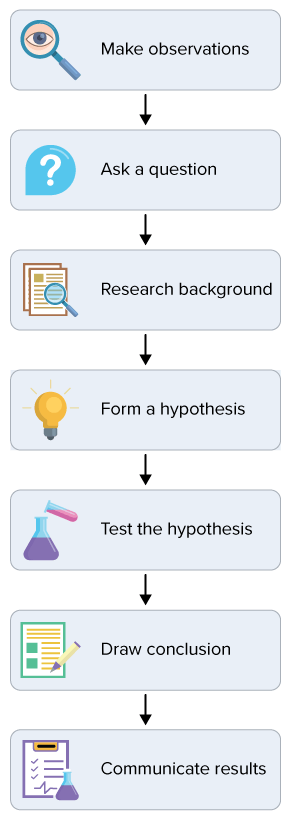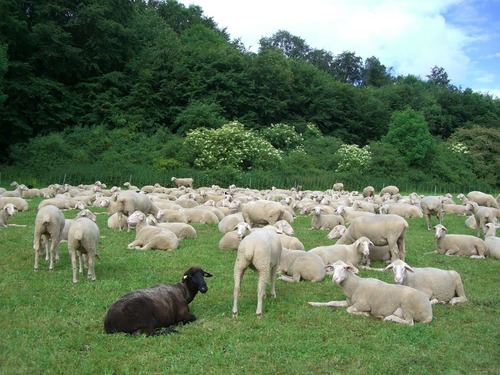1.3 科学方法-先进
章节大纲
-
What is the method of science?
::什么是科学方法?How is science "done?" It can be difficult sometimes to define research methods in a way that will clearly distinguish science from non-science. However, there is a set of core principles that make up the “bones” of scientific research. These principles are widely accepted within the scientific community. Although there is no fixed set of steps that scientists always follow during an investigation, and there is no single path that leads scientists to knowledge, there are certain features of science that give it a distinct way of investigating.
::科学是如何“成交的?”有时很难以明确区分科学和非科学的方式界定研究方法。然而,科学研究的“骨骼”是一套核心原则。 这些原则在科学界得到广泛接受。 尽管科学家在调查中没有一贯遵循的固定步骤,也没有一条单一的路径引导科学家获得知识,但科学的某些特征却使它有了独特的调查方式。Scientific Methods
::科学方法Scientific investigations examine, gain new knowledge, or build on previous knowledge about phenomena. A phenomenon is any occurrence that is observable. It can be simply a burning match shown in the Figure , as well as the structure of a and the prey of a lion. A phenomenon may be a feature of matter, energy , or time. For example, Isaac Newton made observations of the phenomenon of the moon's orbit, Galileo Galilei made observations of phenomena related to swinging pendulums and Charles Darwin made observations of unique plant and . Although procedures vary from one field of scientific inquiry to another, certain features distinguish scientific inquiry from other types of knowledge. Scientific methods are based on gathering observable, empirical (produced by or observation), and measurable evidence that is critically evaluated.
::科学调查研究、获得新知识或以以前对现象的了解为基础。一种现象是一种可以观测到的任何现象。它可能只是图中显示的一种燃烧的匹配物,以及狮子和猎物的结构和结构。一种现象可能是物质、能量或时间的特征。例如,Isaac Newton观测了月球轨道现象,Galilei观测了与摇摆时钟有关的现象,Charles D达尔文观测了独特的工厂和。虽然不同科学调查领域的程序不同,但某些特征将科学调查与其他类型的知识区分开来。科学方法的基础是收集可观测、经验(由观测或观察产生)以及经过严格评估的可测量证据。The combustion of this match is an observable event and therefore a phenomenon. Scientific Investigations
::科学调查The scientific method is not a step-by-step, linear process. It is a way of learning about the world through the application of knowledge. Scientists must be able to have an idea of what the answer to an investigation should be. For scientists to make educated guesses about the answers, they will base their guesses on previous knowledge, with the notion of extending that knowledge. Scientists will often make an observation and then form a hypothesis to explain why a phenomenon occurred. They use all of their knowledge and a bit of imagination in their journey of discovery.
::科学方法不是一个逐步的、线性的过程,它是一种通过应用知识来了解世界的方式。科学家必须能够知道调查的答案是什么。科学家们要想对答案作出有教育性的猜测,他们就必须根据先前的知识来猜测答案,其概念是扩展知识。科学家们往往会进行观察,然后形成一个假设来解释一个现象的发生原因。他们在探索的旅途中利用了他们的所有知识和一些想象力。A hypothesis is a suggested explanation of a question or problem, based on evidence that can be tested by observation or experimentation. A hypothesis absolutely must be testable-- it gains credibility by being tested over and over again, and by surviving attempts to prove it wrong. Scientists may test and reject several hypotheses before solving a problem.
::假设是对一个问题或问题的一种建议的解释,其依据是可以通过观察或实验检验的证据。 假设绝对必须是可以检验的 — — 即通过一次又一次的测试和通过试图证明其错误而获得可信度。 科学家在解决问题之前可以测试和拒绝若干假设。Scientific investigations involve the collection of data through observation, the formation and testing of hypotheses by experimentation, and analysis of the results that involve reasoning. Scientific investigations begin with observations that lead to questions.
::科学调查涉及通过观察收集数据,通过实验形成和测试假设,分析涉及推理的结果,科学调查首先从导致问题的意见开始。We will use an everyday example to show what makes up a scientific investigation. Imagine that you walk into a room, and the room is dark.
::想象一下,你走进一个房间,房间是黑暗的。-
You observe that the room appears dark, and you question why the room is dark.
::你注意到房间看起来很暗 你质疑为什么房间很黑 -
In an attempt to find explanations for this phenomenon, you develop several different hypotheses. One hypothesis might be that the room does not have a light source at all. Another hypothesis might be that the lights are turned off. Still, another might be that the light bulb has burnt out. Worse yet, you could be going blind.
::为了寻找这一现象的解释,你提出了几种不同的假设。一个假设可能是房间根本没有光源。另一个假设可能是灯光被关了。另一个假设可能是灯泡被烧了。更糟糕的是,你可能失明了。 -
To discover the answer, you experiment. You feel your way around the room and find a light switch and turn it on. No light. You repeat the experiment, flicking the switch back and forth; still nothing.
::为了发现答案,你实验。你感觉你走在房间里, 找到一个灯开关,然后打开它。没有灯。你重复实验,回转开关,还是一无所有。 -
This means your first two hypotheses, that the room is dark because (1) it does not have a light source; and (2) the lights are off, have been disproved.
::这意味着你最初的两个假设,即房间是黑暗的,因为1) 房间没有光源;(2) 灯光被关,已被反驳。
-
You think of more experiments to test your hypotheses, such as switching on a flashlight to prove that you are not blind.
::你想象更多的实验来测试你的假设, 比如用手电筒 来证明你不是瞎子。 -
In order to accept your last remaining hypothesis as the answer, you could predict that changing the light bulb will fix the problem. If your
predictions
about this hypothesis succeed (changing the light bulb fixes the problem), the original hypothesis is valid and is accepted.
::为了接受你剩下的最后一个假设作为答案, 您可以预测改变灯泡会解决问题。 如果您对这个假设的预测成功( 改变灯泡修补问题) , 最初的假设是有效的, 并且被接受 。 -
However, in some cases, your predictions will not succeed (changing the light bulb does not fix the problem), and you will have to start over again with a new hypothesis. Perhaps there is a short circuit somewhere in the house, or the power might be out.
::然而,在某些情况下,你的预测不会成功(改变灯泡并不能解决问题 ) , 并且你将不得不用新的假设重新开始。 也许房屋里有一条短路,或者电力可能断了。
The general process of a scientific investigation is summed up in Figure .
::科学调查的一般过程汇总于图12。The general pathway of a scientific investigation. A scientific investigation typically has these steps, though the pathway is often modified for a specific scientific investigation. The general process of scientific investigations. This diagram illustrates how scientific investigations move from observation of a phenomenon to a theory. The progress is not as straightforward as it looks in this diagram. Many times the hypothesis is falsified, which means the investigator will have to redevelop/revise a hypothesis. Term Definition Scientific Method The process of scientific investigation. Observation The act of noting or detecting a phenomenon by the . For example, taking measurements is a form of observation. Hypotheses A suggested explanation based on evidence that can be tested by observation or experimentation. The process of looking for scientific reasons for observations. Experiment A test that is used to rule out a hypothesis or validate something already known. Rejected Hypothesis An explanation that is ruled out by experimentation. Confirmed Hypothesis An explanation that is not ruled out by repeated experimentation, and makes predictions that are shown to be true. Inference Developing new knowledge based upon old knowledge. Theory A widely accepted hypothesis that stands the test of time. Theories are often tested, and usually not rejected. Making Observations
::提出意见意见Scientists first make observations that raise questions. An observation is the act of noting or detecting a phenomenon through the senses. For example, noting that a room is dark is an observation made through sight .
::一种观察是通过感官注意到或发现一种现象的行为,例如,注意到一个房间是暗的,就是通过视觉观测到的。Developing Hypotheses
::发展假设In order to explain the observed phenomenon, scientists develop a number of possible explanations or hypotheses. A hypothesis is a suggested explanation for a phenomenon or a suggested explanation for a relationship between many phenomena. Hypotheses are always based on evidence that can be tested by observation or experimentation. Scientific investigations are required to test hypotheses. Scientists mostly base hypotheses on prior observations or on extensions of existing scientific explanations.
::为了解释观察到的现象,科学家们可以提出一些可能的解释或假设,一种假设是对一种现象的一种建议解释,或对许多现象之间的关系的一种建议解释,一种假设是假设,假设总是基于可以通过观察或实验检验的证据,科学调查必须检验假设,科学家们主要根据先前的观察或现有科学解释的延伸来推断。Though many people describe a hypothesis as an "educated guess," that definition is not scientifically accurate. To define a hypothesis as "an educated guess" is like calling a tricycle a "vehicle with three." This definition of a tricycle leaves out its most important and characteristic feature: its wheels. The "educated guess" definition of a hypothesis also leaves out the concept's most important and characteristic feature: the purpose of the hypotheses. People generate hypotheses as early attempts to explain patterns observed in nature or to predict the outcomes of experiments. For example, in science, one could correctly call the following statement a hypothesis: identical twins can have different personalities because environment influences personality.
::尽管许多人将假设描述为“教育猜想”,但该定义在科学上并不准确。将假设定义为“教育猜想”就像将三轮车定义为“三轮车 ” 。三轮车的这个定义遗漏了它最重要的和特征:轮子。“教育猜想”的假设定义也遗漏了这个概念的最重要和特征:假设的目的。人们产生假说,作为早期试图解释自然观察到的模式或预测实验结果的尝试。例如,在科学中,人们可以正确地将以下说法称为假设:相同的双胞胎可以具有不同的个性,因为环境会影响个性。Evaluating Hypotheses
::评估假设Scientific methods require hypotheses that are falsifiable , that is, they must be framed in a way that allows other scientists to prove them false. Proving a hypothesis to be false is usually done by observation and experimentation. However, confirming or failing to falsify a hypothesis does not necessarily mean the hypothesis is true.
::科学方法要求可以伪造的假设,也就是说,必须让其他科学家证明这些假设是假的。 证明假假设通常通过观察和实验进行。 然而,证实或未能伪造假设并不一定意味着假设是真的。For example, a person comes to a new country and observes only white sheep. This person might form the hypothesis: “All sheep in this country are white.” This statement can be called a hypothesis, because it is falsifiable - it can be tested and proved wrong; anyone could falsify the hypothesis by observing a single black sheep, shown in Figure . If the experimental uncertainties remain small (could the person reliably distinguish the observed black sheep from a goat or a small horse), and if the experimenter has correctly interpreted the hypothesis, finding a black sheep falsifies the "only white sheep" hypothesis. However, you cannot call a failure to find non-white sheep as proof that no non-white sheep exist.
::例如,一个人来到一个新国家,只观察白羊。这个人可以提出假设:“这个国家的所有羊都是白色的。” 这种说法可以称为假设,因为它是伪造的——可以测试和证明是错误的;任何人都可以通过观察图中显示的一只黑羊来伪造假设。如果实验的不确定性仍然很小(这个人能否可靠地将观察到的黑羊与一只山羊或小马区分开来),如果实验者正确解释假设,发现一只黑羊伪造了“只有白羊”的假说。然而,你不能将找不到非白羊的情况称为证明不存在非白羊的证据。The statement “there are only white sheep in this country” is a hypothesis because it is open to being falsified. However, failure to see a black sheep does not necessarily falsify the hypothesis. A better scientific hypothesis may be that "only white sheep can survive in this country because of the existing ecosystems." Summary
::摘要-
Scientific investigations involve the collection of data through observation, the formation and testing of hypotheses by experimentation, and analysis of the results that involves reasoning.
::科学调查涉及通过观察收集数据,通过实验形成和测试假设,分析涉及推理的结果。
Review
::回顾-
Describe the scientific method.
::说明科学方法。 -
What is an hypothesis?
::什么是假设? -
How is a hypothesis developed and evaluated?
::假设是如何发展和评估的? -
What is meant by falsifiable?
::伪造是什么意思? -
What happens if a hypothesis is false?
::如果假设是假的怎么办?
-
You observe that the room appears dark, and you question why the room is dark.




